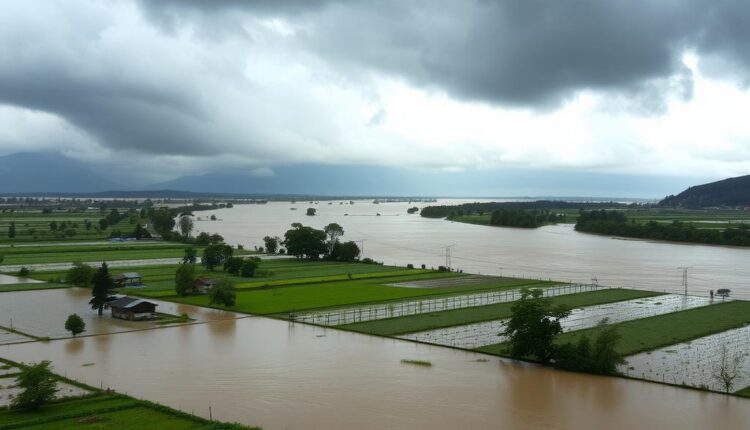Muhammad Daied Shah
As a student of law and a 2025 Millennium Fellow committed to the UN’s Sustainable Development Goal on Climate Action, I find it impossible to ignore the environmental disquiet settling over our homeland.
We, in Jammu and Kashmir, often refer to our land as ‘paradise’. But this paradise is now on the frontline of an existential battle: a severe and accelerating climate crisis. This is no longer a distant threat; it is a clear and present danger unfolding in our backyards, threatening our water, our food, and our very way of life.
Our region, a critical part of the ecologically fragile Himalayan ecosystem, is witnessing climate change at a rate far exceeding the global average. The evidence is no longer subtle; it is stark and alarming.
The Writing on the Wall
The crisis in J&K is not one of a single symptom, but a systemic failure driven by global warming and exacerbated by local inaction.
The most dramatic evidence is the state of our glaciers. The Kolahoi Glacier, often called the “water tower” of the Kashmir valley and the primary source of the Jhelum River, is shrinking at an alarming rate. Satellite data shows it has lost a significant portion of its mass.
This isn’t just an environmental statistic; it is a direct threat to the water security of millions who depend on the Jhelum for drinking water, irrigation, and power generation.
“The Kolahoi Glacier, once the water tower of Kashmir, is shrinking before our eyes. Its retreat is not a remote tragedy — it is a direct threat to the water security of millions who depend on the Jhelum River.”
Ask any farmer in the valley, and they will speak of a climate they no longer recognize. The traditional weather cycle has been shattered. We see intense, erratic rainfall causing flash floods, followed by prolonged dry spells.
The devastating floods of September 2014 were a tragic preview of our vulnerability. Unplanned urbanization along the Jhelum’s floodplains turned a natural event into a man-made catastrophe. Simultaneously, regions in Jammu are facing increasing drought-like conditions, impacting our agricultural backbone.
Our economy is uniquely vulnerable. The famed Kashmiri apple, our economic stalwart, is under stress. The shifting weather patterns—specifically the reduction in adequate snowfall—fail to provide the necessary “chilling hours” for the trees, leading to lower yields.
“We, in Jammu and Kashmir, often refer to our land as paradise — but this paradise now stands on the frontline of an existential battle. The climate crisis here is no longer distant; it unfolds daily in our backyards, threatening our water, our food, and our very way of life.”
The iconic saffron fields of Pampore are yielding less due to moisture stress, and our tourism industry, which thrives on natural beauty, is threatened by everything from snow-less winters in Gulmarg to washed-out trekking routes.
A Path Forward: Policy and Governance
As a law student, I believe that while the problem is environmental, the solutions must be rooted in robust policy and legal frameworks. The government bears a significant responsibility to pivot from reactive management to proactive governance.
First, we must enforce the law in land use. The 2014 floods exposed the catastrophic failure of our regulations. We must enforce an immediate ban on new construction in vulnerable floodplains and wetlands. The J&K State Action Plan on Climate Change (JKSPCC) must be updated and, more importantly, implemented with strict regulatory oversight.
Second, we need a mandate for water security. This means investing heavily in catchment area treatment, reviving our traditional springs, and mandating rainwater harvesting in all new urban constructions.
Third, we must invest in a green transition. This includes a robust solar policy for urban centres and investing in modern, climate-resilient agricultural techniques for our farmers.
Finally, we must fix our urban mess. The pollution in Dal Lake or the Tawi River is a symptom of failed Solid Waste Management. A decentralized, legally-binding waste management system is essential.
Our Collective Covenant
The government cannot act in a vacuum. The UN principle of “Sustainability” is a call for community action. We, the people of J&K, are the guardians of this land.
We must revive community stewardship. This means organizing community-led afforestation drives—planting native species—and protecting our local water bodies from pollution.
We must embrace water consciousness. Every household must adopt water-saving practices. Simple acts like repairing leaks are crucial when our glaciers are disappearing.
We must demand accountability. We need to question unsustainable projects, demand better public transport, and hold our representatives accountable for implementing the climate action plan.
We must also practice responsible consumption. The “use and throw” culture, particularly plastic, is choking our ecosystem. We must consciously reduce our consumption and segregate our waste.
Conclusion
The climate crisis is a challenge to our very identity, which is inextricably linked to the mountains and rivers of Jammu and Kashmir. This is a matter of intergenerational equity—a legal and moral principle that we must uphold the right of future generations to inherit the same beautiful, life-sustaining land that we did.
As a Millennium Fellow, I believe in our collective capacity for change. But we must act now. We must blend our ancestral wisdom with modern policy. The time for apathy is over. The time for action is now.
Author is a Law Student and a 2025 Millennium Fellow advancing UN SDG 13 (Climate Action).


Comments are closed.